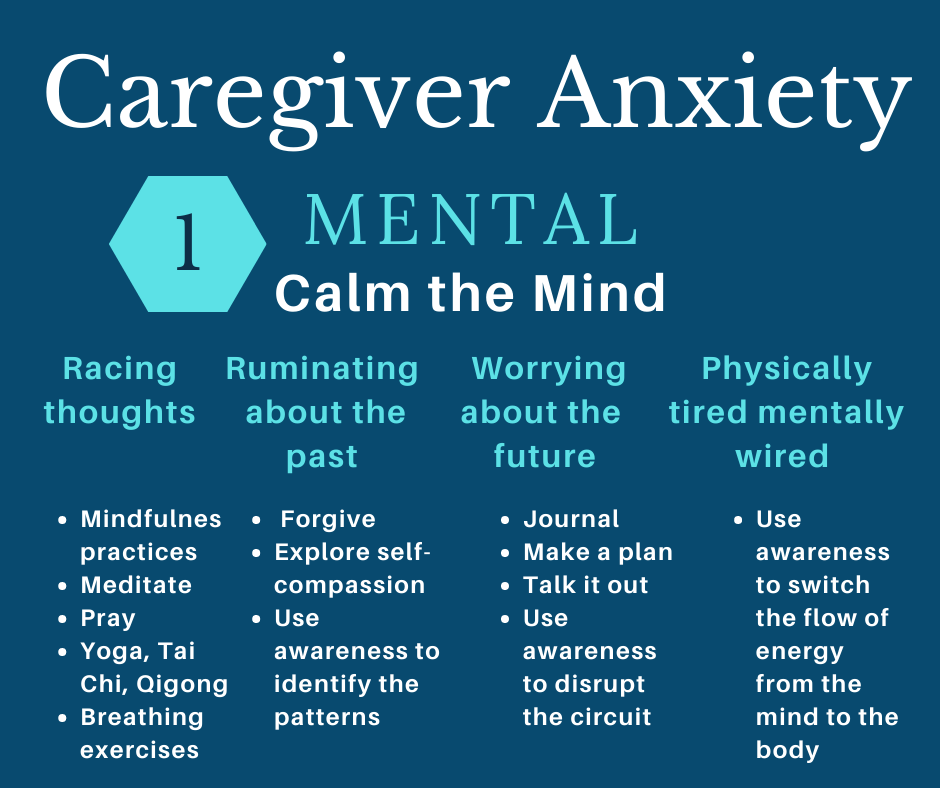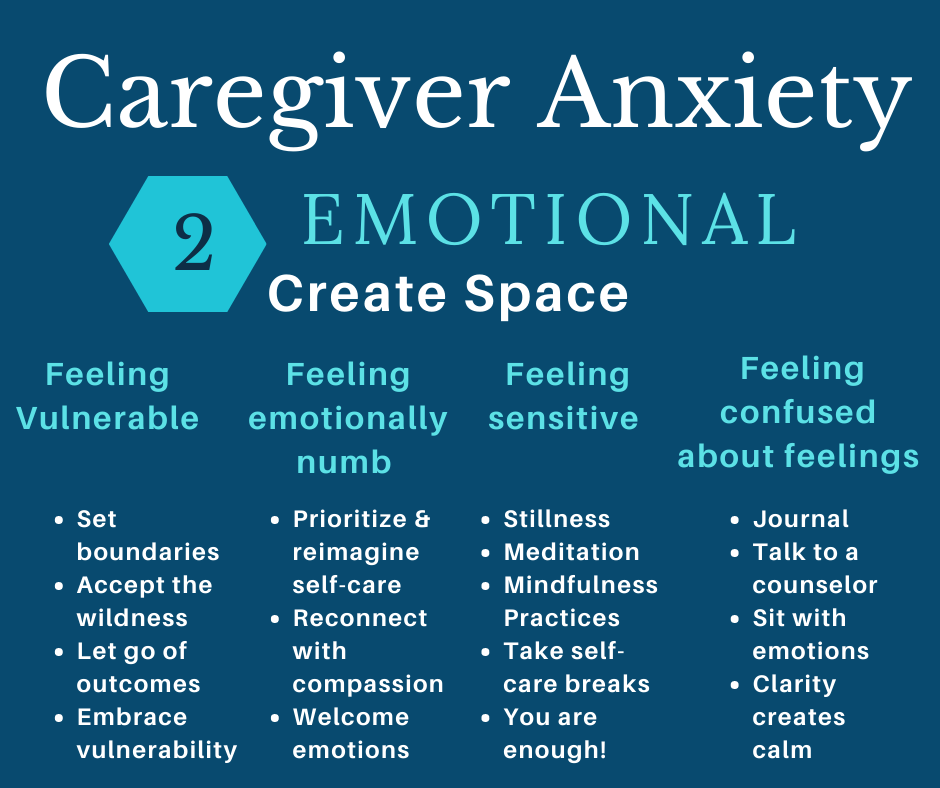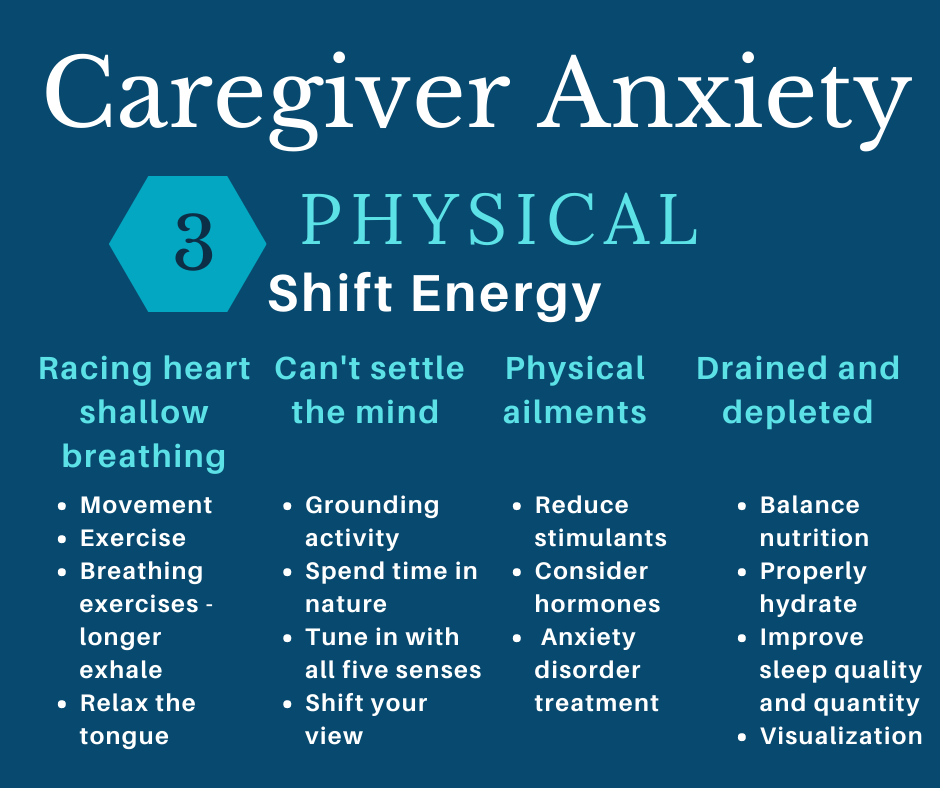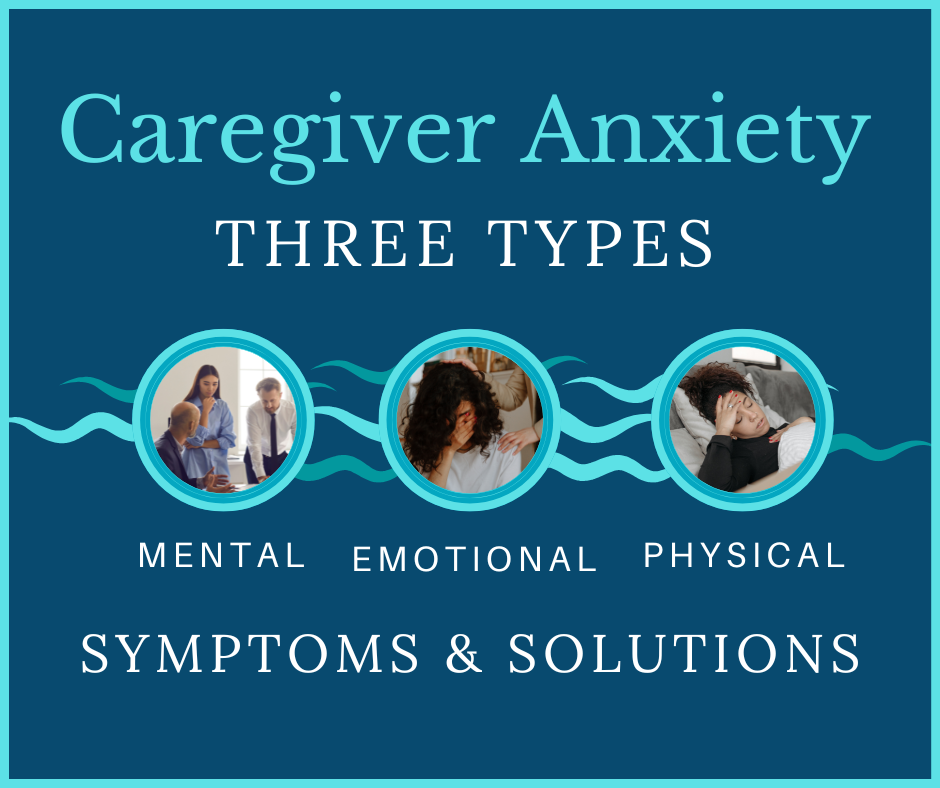It is helpful to understand the type of caregiver anxiety we are experiencing so that we use the proper techniques to counter the effects. For example, mental anxiety can be aggravated by trying to problem-solve with thoughts. Calming our thoughts is the key to relieving anxiety, which is very challenging when thoughts are swirling, and the cyclone is fueled by fear. Paying attention to anxiety and labeling it by type, mental, emotional, or physical, can help you identify the helpful and supportive activities or non-activities that ease the angst. Let’s explore the three types of caregiver anxiety including symptoms and solutions.
Type 1: Mental Anxiety
Mental anxiety occurs when negative thoughts have consumed our consciousness. We can’t escape our minds and find peace because these uncomfortable, all-consuming thoughts are with us day and night.

Symptoms and solutions for caregiver mental anxiety
Racing thoughts
When we suffer from mental anxiety, our mind is overactive and racing. We replay events and conversations or run through possible future scenarios. The way to calm racing thoughts is to disrupt the circuit and calm the mind. Meditation and mindfulness practices are two ways to reach a calmer, more peaceful place. Ironically, the swirling thoughts are the barrier to the activities that can help us feel better, so we may need to choose a more active approach to mindfulness. Yoga, tai chi, and qigong are three mindfulness practices that include movement to help us reach stillness. Breathing exercises are also effective at calming both the mind and body, racing thoughts, and racing heart.
Ruminating on the past
We may be anxious about something that happened in the past and are reliving it repeatedly. Maybe we feel that we were unfairly judged by a family member about the care that we were providing. We may be ruminating on an interaction where we felt unheard or misunderstood. Maybe we feel that we were unfairly judged by a family member about the care that we were providing.
If anxiety is caused by ruminating on the past or worrying about the future, you can use awareness to explore thought patterns and employ forgiveness or self-compassion to calm the repetitive attention.
Worrying about the future
Or, rather than ruminating on the past, we are ruminating or worrying about the future. The “what ifs” take control of our thoughts, and we are doom-scrolling through all of the worst-case scenarios. We worry about not only our family member’s future but also our own.
If worry about the future is the source of mental anxiety, awareness can help disrupt the thought circuit. Journaling a plan can help quell the worry. Because the objective is to calm the mind, thinking more rather than less is generally an ineffective tactic to reduce mental anxiety, but having a plan can take the worry out of the infinite loop and put it on paper where it will not be a constant distraction. You could also select someone to vent to who will hear and validate your worry. Feeling seen and heard can help us feel less alone and less anxious.
Tired and wired
Have you ever been physically exhausted but could not sleep because the mind won’t settle? We can become addicted to worrying, and while our worries might switch from one subject to the next, our mind is still stuck in the entrenched channel that leads to worry in the brain. You can think of it as always being tuned in to the worry channel.
When we take a minute to ground ourselves and pay attention to physical sensations, we shift the flow of energy from our mind to our body, where we can release the tension by relaxing. All of these practices are helping us retrain our mind and choose new channels so that we rewire the patterns of thought.
The way to relieve mental anxiety is to disrupt the circuit and calm the mind. Meditation and mindfulness practices are two ways to reach a calmer, more peaceful place. Ironically, the swirling thoughts are the barrier to the activities that can help us feel better, so we may need to choose a more active approach to mindfulness. Yoga, tai chi, and qigong are three mindfulness practices that include movement to help us reach stillness. Breathing exercises are also effective at calming both the mind and body, racing thoughts, and racing heart.
Type 2: Emotional Anxiety
When we suffer from emotional anxiety, we feel vulnerable and not in control of our experience. We can feel emotionally numb and no longer feel compassion for ourselves or others. We feel sensitive and easily triggered, reacting rather than acting with intent. We can be confused by our extreme feelings and uncomfortable emotions.

We look in the mirror, don’t recognize who we have become, and worry if the adverse changes are permanent. We may not realize the role that fear plays behind the scenes of our swirling emotions. Fear is fueling the cyclone and adding to the overwhelm.
Symptoms and solutions for caregiver emotional anxiety
Feeling Vulnerable
We feel vulnerable and at the mercy of circumstances beyond our control. We can set boundaries to protect our physical and emotional limits. The most important boundaries are the ones we set with ourselves around how much is too much help and how much is too much emotional investment into worry.
We can re-imagine control by letting go of outcomes and expectations. In part, that means acknowledging the wildness of the experience, accepting that there will be rapids, obstacles, waterfalls, unexpected turns, and, hopefully, a few calm sections. We step into the flow. It is like saying okay to whatever comes our way and even turning the challenges into advantages. When we re-imagine control, we reduce our stress because we no longer battle for control; we have it!
We can embrace our vulnerability by sharing our struggle with someone who not just understands what we are experiencing and what we are feeling but validates it. These venting allies get us and what we are going through because they have been there. Venting, releasing the pain and the pressure, is self-care and can reduce anxiety and feelings of depression. We are not alone.
Feeling emotionally numb
We can feel emotionally numb when we have given so much of ourselves that we are empty. Our capacity for compassion, our compassion reserves, is depleted. We no longer feel compassion for ourselves, our care receiver, or anyone.
We can reconnect with our compassion by re-imagining self-care and prioritizing our well-being. Once we get the formula dialed in and our compassion is replenished, it can be like putting on glasses with a new prescription, but instead of seeing things clearly again, we feel things clearly again. Compassion returns as our compass as we continue our caregiving journey. We can welcome these emotions, even the uncomfortable ones. They become our warning signals. We can process them safely so that they empower us to continue our journey with confidence.
Feeling sensitive
When we experience emotional anxiety, we can feel sensitive and be easily triggered. We are often at a low point in life, and our coping skills have been diminished by repeated stress and overwhelm. Caregiving is a trigger minefield.
Mindfulness helps us disarm the mines and cultivate calm. Meditation and mindfulness practices help us develop awareness and teach us how to be present. Awareness and presence can help us pause the script and rewrite it so that we minimize stress and regret.
Taking moments to be still or engage in a calming self-care activity can slow the frantic pace and create the space we need to reset and continue from a more grounded place.
We can re-imagine control by letting go of outcomes and expectations. In part, that means acknowledging the wildness of the experience, accepting that there will be rapids, obstacles, waterfalls, unexpected turns, and, hopefully, a few calm sections. We step into the flow. It is like saying okay to whatever comes our way and even turning the challenges into advantages. When we re-imagine control, we reduce our stress because we no longer battle for control; we have it!
Feeling confused about feelings
We can be confused about our feelings and wonder, why is this so hard, why am I not handling it better. It is hard. You are managing extreme circumstances and extreme emotions and doing your best.
It can help to process the events and emotions by journaling or talking to a counselor, caregiver consultant, or coach. When we explore the uncomfortable emotions, the fear, and the confusion, clarity leads us to compassion for ourselves and others.
Just remember, you are enough! This is a powerful statement. “I am enough” is a powerful mantra. It can be easy to say and yet so challenging to feel. When you are able to feel genuine compassion for yourself, you will know that you are enough. It doesn’t mean you are perfect; it means that you show up, you do your best, and you will continue to learn and grow. Be gentle with yourself. You are enough.
Type 3: Physical Anxiety
When we suffer from physical anxiety we feel tension, possibly a racing heartbeat that matches our racing thoughts. We may not be able to sit still. We try to rest but can’t, repeatedly getting up to check on this or that.

The anxious energy is trapped in our body and it needs to be released. We may feel a sense of dis-ease. We want to come back to our bodies or back to our surroundings. Shifting our energy will bring us back to the present moment.
Symptoms and solutions for caregiver physical anxiety
Racing heart, shallow breathing
In addition to a racing heartbeat, we might hold tension in our bodies. We recognize and relax the tension only to notice that we are later holding our breath. Movement can help us break the cycle. Regular exercise can train our hearts to better handle stress. Breathing exercises done throughout the day can stop the pattern of holding our breath. All of these activities can lead to a more relaxed physical state during stressful and non-stressful periods. Taking a longer exhale, a five-count inhale and a seven-count exhale for three minutes will calm our nervous system.
Another technique to try is to use your tongue to relax your mind. Our thoughts produce micro-movements in our tongue which is connected to the left frontal lobe of the brain and when we relax our tongue, we calm the thoughts which will, in turn, relax our mind creating a calming feedback loop. Awareness of the connection and training can lead to a quieter mind.
Can’t settle the mind
We may try to relax and settle into reading a book, and our mind keeps jumping to unfinished tasks prompting us to jump up and do this or that. Our stirred thoughts keep our bodies in motion, making it hard to sleep, and leading to more uncomfortable physical symptoms. Fritz Perls said, “Lose your mind and come to your senses.” Use the five senses to come back to your surroundings. Notice five things you can see, four things you can hear, three things you can feel, two things you can smell, and one thing you can taste. You might notice your surroundings as of you were seeing everything for the first time and notice the colors, shapes, and movements with a new perspective, a new view.
Physical ailments
Anxiety can manifest in physical symptoms such as gastrointestinal troubles, headaches, chronic pain, and more. Trapped trauma or blocked emotions can cause physical ailments. When our feelings and emotions are blocked rather than flowing through us like our breath, we may feel constricted, heavy, or tight. We can make changes to our diets such as reducing our intake of stimulants like sugar or caffeine. We might consult with a medical professional to evaluate our hormone balance. If we feel our physical ailments are connected to anxiety we can explore the possibility of an anxiety disorder with our healthcare professional.
Drained and depleted
Lack of sleep, lack of proper nourishment, and the weight of our worries can cause us to feel exhausted, drained, and depleted.
Sleep
Good quality sleep is crucial for us to be at our best when facing the challenges of caregiving. But, while caring for a family member, our sleep quantity and quality can suffer due to care responsibilities, or we lie awake at night due to worries. Lack of proper sleep affects our ability to think clearly, and causes us to feel disorganized, we can be quicker to anger, and feel hopeless. On the other hand, sufficient sleep has been linked to benefits such as heart health, a more robust immune system, better brain function, improved mood, and reduced stress. Specifically, when we sleep well, our thinking is more precise, we are less susceptible to mental and physical illnesses, and we can better tolerate incidents that cause frustration.
Nutrition
Choosing the foods that support our well-being can be challenging when caregiving responsibilities overwhelm our days. It is helpful to understand which foods support our well-being, how they make a difference, and how to easily incorporate them into snacks and meals. It is important to eat regularly so that our brain is fueled and functioning at optimum levels to make those difficult decisions. Foods that support our nervous system are what we would expect, fruits, vegetables, and whole foods. Consuming foods with protein on a regular schedule throughout the day, hungry or not can keep us from feeling sluggish. Remember routine and protein! Carbs and comfort foods have their place as well, in moderation.
Recent studies have shown that eating fermented foods such as kimchi and kombucha can lower our stress. A psychobiotic diet has also been tied to improved sleep. There is much more to learn about the gut-brain connection, but it has been determined that cognition and emotional state are connected to our gut and what we eat has an impact on our mental health.
Hydration
Simply staying well hydrated can reduce our stress levels. When our heart rate is elevated and breathing is more rapid, we lose fluid and are more likely to get dehydrated. When we are dehydrated, the levels of the stress hormone cortisol increase in our bodies. In addition, because our organs rely on water to function well when we’re dehydrated our body is stressed and not optimally supporting us. This cycle can be disrupted by drinking more hydrating fluids. Calming herbal teas can hydrate and provide added stress-relieving benefits. Hydrating on a schedule or tracking fluid intake with an app can help us stay on track.
Visualization
Another way to shift the energy in our body is to tune into how our body feels when we are in our happy place. Visualize your happy place. What does it feel like in your body? Where do you relax? When you connect that feeling of relaxation in your body with the comforting thought or memory, you can go to your happy place in your mind and your body will follow. Even if it is just a part of your physical body that relaxes, your energy shifts.
Becoming aware of where your body holds stress, sadness, and grief can help you relax and release pent-up energy. It is okay to be sad, and feel grief, and it is healthy to sit with these feelings so that we can process them. We just don’t want to be debilitated by them and we can learn to regulate our emotions in a way that helps us feel more emotionally and physically balanced.
For more on how to minimize stress, maximize meaning and navigate your journey with confidence, check out Navigating the Caregiver River: A Journey to Sustainable Caregiving, or tune into the Self-Caregiving Strategies Podcast.
Schedule Theresa Wilbanks to speak on caregiving and empower the caregivers in your workplace or community with the 12 Sustainable Caregiving Strategies.
Advice offered is for general information only; please contact your healthcare team, legal or financial advisors to guide your particular situation.


Very helpful article. Great insight into the life of the caregiver. Very intentional tips and strategies . I plan to implement and refer to this article often. I have shared it with a fellow caregiver, friend.
I am so glad you found it helpful.